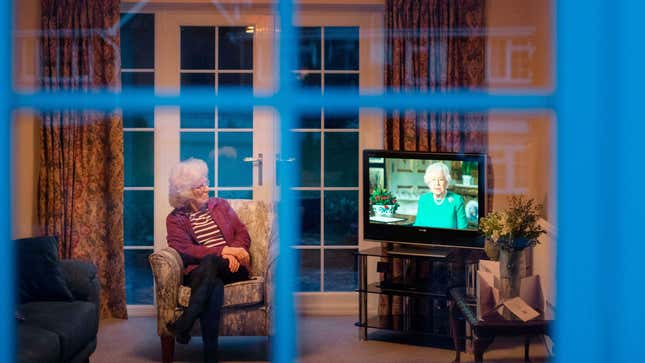The Queen's Speech and the World War II Metaphor
In Depth

With the coronavirus crisis worsening in the UK and around the world, Queen Elizabeth II took the rare step on Sunday of issuing a special address to the nation—one of just a few she’s done outside of her annual Christmas Day speech. Unsurprisingly, she turned to the metaphor that has dominated in recent days, as the situation grows grimmer: World War II.
In many ways, the speech was an echo of her father King George VI’s famous address to the nation in 1939, at the beginning of World War II, an attempt to rally the nation to its task in a moment of profound crisis. Elizabeth made the connection explicit. She evoked the first speech she ever delivered, when along with her sister Margaret she spoke to children who’d been evacuated from London for protection, at the height of the Blitz. The Queen drew a straight line to connect the two situations: “Today, once again, many will feel a painful sense of separation from their loved ones. But now, as then, we know deep down that it is the right thing to do.”
And the final line of the speech—Elizabeth’s assurance that “we will meet again”—was a reference to one of the most iconic songs of the era, Vera Lynn’s “We’ll Meet Again.” Recorded in 1939, the song urges, “Keep smiling through / Just like you always do / ‘Till the blue skies drive the dark clouds far away,” an ode to the idea of bucking up which context turned into wartime Britain’s equivalent of a tearjerker. For a period in 1941, Lynn had a hugely popular radio show where she’d read messages from people who were separated, closing out every broadcast with the tune. And the song hits with renewed force in 2020, as people are separated from their friends, family, and loved ones.
Leaders in both the US and the UK have turned to World War II metaphors to describe the challenges
As the coronavirus crisis has worsened, leaders in both the US and the UK have turned to World War II metaphors to describe the challenges; “This is going to be our Pearl Harbor moment,” the U.S. Surgeon General said this weekend, as he warned the country to brace for the week ahead. The struggle to contain a pandemic is very different from literal warfare, but the comparison isn’t surprising. World War II is important to both nations’ narratives about themselves in the decades since and central to their “special relationship.” But the war’s shadow is particularly long in the United Kingdom, where the time period is a central pillar of national mythology. The idea that Britain held out alone against Hitler birthed the image of Britain as the tough island that punches far, far above its weight. It’s a concept that has animated the Brexit debate: concerns about the potential fallout of leaving the EU were met with appeals to the nation’s “Dunkirk spirit.”
Boris Johnson has been especially guilty of dealing in nostalgia for Britain’s wartime heroism. But the Dunkirk metaphor probably looks a little different from a bed in the intensive care unit, which is where Johnson finds himself after his government initially opted for an approach of letting coronavirus take its course until “herd immunity” was established. And the last line of the Queen’s speech suggests the reality that glimmers through the tales of national greatness, one which most national leaders are too young to remember for themselves: The reason “We’ll Meet Again” was such an iconic wartime song is because many people wouldn’t, and everybody knew it.